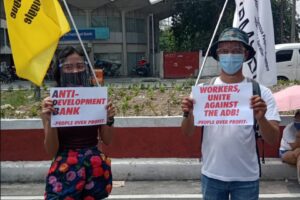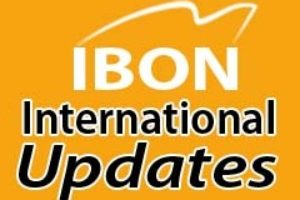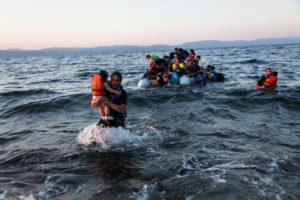Photo: Priest Fr. Marco Sulayao, one of the 42 activists in Iloilo, cuffed by police / Still frame from a video by Panay Today
We assert that unjustly arresting and detaining relief volunteers, at a time when they are most needed, is an utter folly and an injustice to the people suffering from the slow trickle of the Philippine government’s aid. It is another brick on working people’s backs amid general gaps in state support for healthcare and other social services due to prevalent neoliberal policy.
IBON International Statement
2 May 2020
On 27 April, the United Nations High Commissioner for Human Rights (UN OHCHR) has already singled out certain states notable for rights violations that arose from “highly militarised” and counterproductive outbreak measures, including China, South Africa, Sri Lanka, El Salvador, and the Philippines. Outside of these, repression was also reported in states such as Kenya, Turkey, Palestine, India, among others. For the UN OHCHR, the Philippines was notable for detaining 120,000 people due to “violating” lockdowns.
Today, IBON International joins other humanitarian initiatives, people’s organisations, and civil society organisations in condemning even more distressing and extensive human rights violations in the Philippines’ militarist lockdown. On 1 May, International Labour Day, several incidents in the country’s National Capital Region saw the unjust arrests of 10 relief volunteers in Marikina City, 18 youth relief volunteers and citizens in Quezon City, and another 4 people in Valenzuela City. Another 42 activists in Iloilo province in central Philippines were arrested for their indignation protest against the brutal killing of a community activist, Jory Porquia, murdered the day prior. Meanwhile, 16 Coca-Cola workers, in urban Santa Rosa City, Laguna province, were falsely presented as “surrenderees” of the countryside-based Maoist armed movement.
We assert that unjustly arresting and detaining relief volunteers, at a time when they are most needed, is an utter folly and an injustice to the people suffering from the slow trickle of the Philippine government’s aid. It is another brick on working people’s backs amid general gaps in state support for healthcare and other social services due to prevalent neoliberal policy. We condemn in highest terms the brutal killings in a time of emergency, such as in the case of Porquia who received police threats for conducting relief initiatives days before he was killed. That a lawyer was among the 42 arrested in Iloilo, who was on the scene for legal aid to the protesting activists, shows that even legal defenders of civil-political rights are not safe from the wave of repression.
Iron-fisted policies will not solve the outbreak, nor cure the long-running social diseases that worsened its social impacts – from poverty, to hunger, labour exploitation, and other violations of economic rights.
IBON International reiterates its position that iron-fisted policies will not solve the outbreak, nor cure the long-running social diseases that worsened its social impacts – from poverty, to hunger, labour exploitation, and other violations of economic rights. Blocking grassroots efforts of solidarity is counterproductive. These obstacles to civil-political rights are at the same time obstacles to the communities’ right to basic needs such as food, health, among others.
In the Philippines, state directives are to account for these obscene rights violations. President Rodrigo Duterte publicly called for shooting quarantine violators dead. The Philippine National Police announced it would arrest without warning, and recently announced possible new spending on tasers despite urgent resource needs for health-based solutions. Previously, the military-led social welfare department was foiled in its attempt to require unnecessary permits just to conduct relief work. All these emboldened various cases of police harassment, assault, and even killings, as “quarantine violators” have been added to the state arsenal of pretexts for an iron hand, alongside “drug users,” “terrorists,” and “communists.” Police have also unjustly arrested relief volunteers in a separate case on 19 April.
In the Philippines, state directives are to account for these obscene rights violations. President Rodrigo Duterte publicly called for shooting quarantine violators dead.
In the case of the Marikina 10 relief volunteers, the police were quick and stubborn to process preposterous charges, which was a clear affront to the local civilian authority’s assertions for their immediate release. It was with public clamour and assertion that the police were forced to release the 10 relief workers in Marikina City, and the 4 activists in Valenzuela City, in the morning of 2 May.
These are added entries in the growing list of brazenly authoritarian states, such as the Philippines under the Duterte administration. It is not surprising that people’s movements call the political climate as undeclared Martial Law. Prior to the pandemic, the Philippine state was already the subject of international concern for killings under the bogus “drug war,” of rights defenders and critics of its neoliberal economic policy. Early in the year, the country’s national rights commission condemned state “counterinsurgency,” with its task force “to end local communist armed conflict,” as a license to harm civilian rights defenders. As in many countries where pre-pandemic authoritarian state tendencies are exacerbated, impunity is further reinforced on pretexts of emergency measures.
In contrast to militaristic responses, a participatory approach is crucial today, one that empowers people’s initiatives that address urgent community needs and defend people’s rights. People’s organisations must have significant voices in pandemic responses affecting them. States must be bound to duties of providing accurate, timely, and relevant public information; adequate economic and food relief; and health services for necessary testing, containment, and treatment. States must be held to account even more, for neglect of these minimum duties and for rights violations.
We call on the international community to join in calls for the immediate and unconditional release of all the arrested humanitarian relief volunteers and activists in the Philippines.
We call on the international community to join in calls for the immediate and unconditional release of all the arrested humanitarian relief volunteers and activists in the Philippines. The international community is also enjoined to demand that the Philippine state do no more harm to people’s relief initiatives; to condemn the mounting rights violations arising from deliberate state neglect of its duties and its continuing militarist strategy; and to end support of state abuses such as in the form of military aid.
In the long run, the reasons for the discriminately heavy burdens of the pandemic on working peoples, such as systemic factors of neoliberal policy, must be reversed. Economic rights and people’s sovereignty must be reclaimed, with peoples’ substantive voices in, even leadership of, development processes and economic trajectories, away from elite-led structures driven by monopoly capitalism. #

![[NEWS] PH CSOs call: Support and engage civil society for people-centred dev’t plans](https://iboninternational.org/wp-content/uploads/2022/09/IMG_2035-300x200.jpg)


